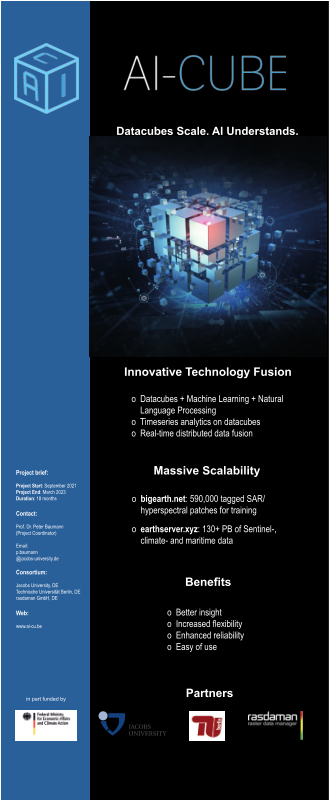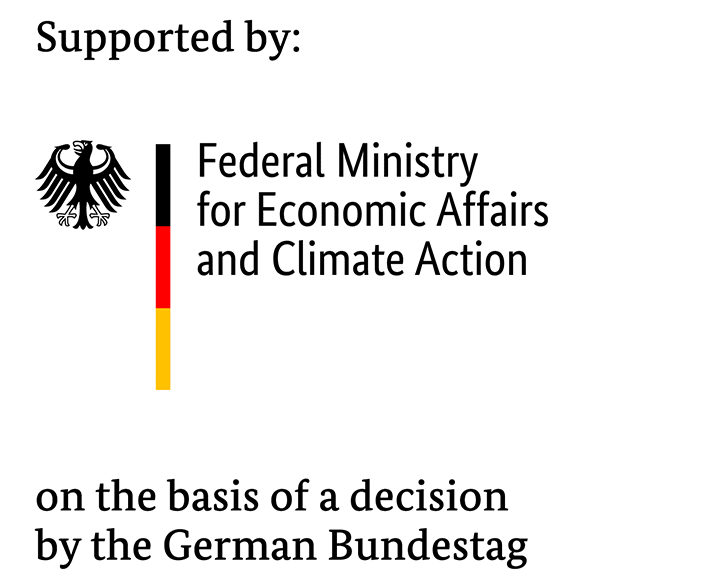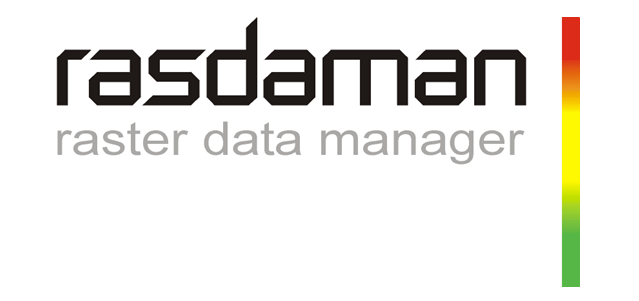AI-Cube™
Datacubes scale. AI understands.

|
AI-Cube™ research now is continued in the FAIRgeo project.
About AI-Cube™

|
Results
ML in the Datacube Engine
The rasdaman datacube engine has been enhanced so that ML models can be invoked from within datacube queries in the OGC-standardized WCPS geo datacube query language via User-Defined Functions (UDFs) to invoke pytorch in the server for model application. From a user (i.e., query writer) perspective this external code appears like a regular query function. It can be used, but not downloaded so that Intellectual Property remains protected. The following example illustrates the principle how pretrained ML models, stored in the database, can be invoked as part of a general analytics query:
for in (Sentinel_2a),
$m in (CropModel)
return encode( nn.predict( $c[...], $m ), "tiff" )
The most important advantages of this integration is that now ML is seamlessly integrated into EO datacube analytics. For example, data can be extracted from a datacube, preprocessed as necessary, then the ML model can work on it, and the output can be processed further with all image processing and statistics functionality available. Additionally, there is a full integration into all optimization, distributed processing, etc. the datacube engine provides already.
A particular twist of the TU Berlin contributed RSVQA technique is the integration with natural language processing: A question is submitted along with the Sentinel patches and the model, and the output again is natural language. The WCPS query has such a structure:
for $S1 in (S1_GRDH_IW),
$S2 in (S2_L2A)
let $patch := [ {space-time selection of 256x256 patch} ],
return
rsvqa.predict2(
$S1[subs2], $S2[subs2],
"rsvqa_trained_model.pt",
"Are there some airports?"
)
Further, the TU Berlin Begum Demir team has developed ConfigILM, a pytorch based library that enables fast development of visual question answering systems. Visual Question Answering (VQA) in remote sensing refers to the task of answering a question formulated in natural language related to the semantic content of the remote sensing images. To support development of models for this task, the Remote Sensing Image Analysis Group (RSiM) at TU Berlin created ConfigILM, a pytorch-based library for configurable combination of pre-trained image and language models.
Publications
- P. Baumann, D. Misev: AI and Datacubes: Towards a Happy Marriage (poster). Proc. ESA Big Data from Space, Vienna, Austria, 2023
- P. Baumann, O. Campos, D. Misev: AI-Enabled Analysis-Ready Datacubes: Towards a Roadmap for More Human-Centric Services. Proc. IEEE Geoscience and Remote Sensing Society (IGARSS), July 2023, Pasadena, USA
- O.J. Campos Escobar, P. Baumann: Implementation Roadmap for Neural Networks in Array Databases. Proc. Computational Science and Computational Intelligence (CSCI), Las Vegas, USA, December 2022, doi: 10.1109/CSCI58124.2022.00024
Visitors
AI-Cube™ Partners
Large-Scale Scientific Information Systems Group, Prof. Peter Baumann (Coordinator)

|
Remote Sensing Image Analysis Group, Prof. Demir Begüm

|
rasdaman GmbH

|
Terms of Reference
Responsible Maintainer
Constructor University Bremen gGmbH
c/o Peter Baumann
Campus Ring 12
28759 Bremen
Trademarks
"AI-Cube" is a trademark of rasdaman GmbH.
Data Protection Regulation (GDPR)
The controller responsible for the described data collection and processing is named in the Constructor University imprint.
When you visit our website, the Web server temporarily stores usage information on our server machine running in Germany) for statistical purposes in the form of a log in order to improve the quality of our website.
We do not transfer your personal data to third parties without your express consent. We use revolvermaps for determining the city of visitors (nothing beyond this anonymized information is available); see their privacy statement which, at the time we evaluated it, obviously was in accordance with GDPR.
When it comes to processing your personal data, the GDPR grants you certain rights as a website user:
- Right of Access (Art. 15 of the GDPR): You have the right to request confirmation as to whether personal data concerning you is being processed; where this is the case, you have a right of access to this personal data and to the information specified in Article 15 of the GDPR.
- Right to Rectification and Right to Erasure (Art. 16 and 17 of the GDPR): You have the right to immediately request the rectification of incorrect personal data concerning you and, if necessary, the completion of incomplete personal data. You also have the right to request that personal data concerning you be erased immediately if one of the reasons listed in Art. 17 of the GDPR applies in detail, e.g. if the data is no longer required for the purposes for which it was collected.
- Right to Restriction of Processing (Art. 18 of the GDPR): You have the right to request a restriction of processing for the duration of a review if any of the conditions specified in Art. 18 of the GDPR have been met, e.g. if you have lodged an objection to the processing.
- Right to Data Portability (Art. 20 of the GDPR): In certain cases (which are outlined in detail in Article 20 of the GDPR), you have the right to obtain from us your personal data in a structured, standard, machine-readable format or to request the transfer of such data to a third party.
- Right to Object (Art. 21 of the GDPR): If data is collected on the basis of Art. 6(1)(f) of the GDPR (data processing on the grounds of legitimate interests), you have the right to object to the processing at any time for reasons arising from your particular situation. If you make such an objection, we will no longer process your personal data unless we can demonstrate compelling legitimate grounds for the processing which override your interests, rights, and freedoms or for the establishment, exercise, or defense of legal claims.
- Right to Lodge a Complaint with a Supervisory Authority In accordance with Art. 77 of the GDPR, you have the right to lodge a complaint with a supervisory authority if you believe that the processing of your personal data violates data protection regulations. This right to lodge a complaint may particularly be exercised before a supervisory authority in the EU member state where you reside, work, or where you suspect that your rights have been infringed.
